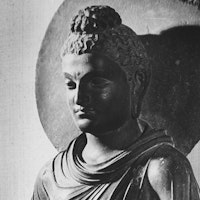“May all beings be happy and secure, may their hearts be wholesome! Whatever living beings there be: feeble or strong, tall, stout or medium, short, small or large, without exception; seen or unseen, those dwelling far or near, those who are born or those yet unborn—may all beings be happy!”
“May all beings be happy and secure, may their hearts be wholesome! Whatever living beings there be: feeble or strong, tall, stout or medium, short, small or large, without exception; seen or unseen, those dwelling far or near, those who are born or those yet unborn—may all beings be happy!”
Gautama Buddha

Discourse on Loving-Kindness
Topic: Love, Compassion, & Kindness
He who is skilled in welfare, who wishes to attain that calm state (Nibbana), should act thus: He should be able, upright, perfectly upright, of noble speech, gentle, and humble. Contented, easily supported, with few wants and simple tastes, with senses calmed, discreet, not impudent, not greedily attached to families…
[He should always hold this thought,] “May all beings be happy and secure, may their hearts be wholesome! Whatever living beings there be: feeble or strong, tall, stout or medium, short, small or large, without exception; seen or unseen, those dwelling far or near, those who are born or those yet unborn — may all beings be happy!”
Let none deceive another, nor despise any person whatsoever in any place. Let him not wish any harm to another out of anger or ill-will. Just as a mother would protect her only child at the risk of her own life, even so, let him cultivate a boundless heart towards all beings. Let his thoughts of boundless love pervade the whole world: above, below, and across without any obstruction, without any hatred, without any enmity. Whether he stands, walks, sits or lies down, as long as he is awake, he should develop this mindfulness. This, they say, is the noblest living here.
Gautama Buddha, also known as Siddhartha Gautama, was a spiritual teacher and the founder of Buddhism. Born in the 6th century BCE in Lumbini, now modern-day Nepal, he was destined for greatness. At the age of 29, he renounced his luxurious life as a prince and embarked on a spiritual quest to find the ultimate truth about human suffering and the nature of existence.
After years of intense meditation and self-discipline, Gautama attained enlightenment under a Bodhi tree in Bodh Gaya, India, at the age of 35. He became the Buddha, which means "the awakened one" or "the enlightened one." Gautama Buddha spent the rest of his life teaching the Four Noble Truths and the Eightfold Path, which formed the core principles of Buddhism. His teachings emphasized the importance of overcoming desire and attachment to achieve liberation from suffering. Known for his compassion and wisdom, Gautama Buddha's teachings have had a profound impact on millions of people worldwide, inspiring them to seek inner peace and spiritual enlightenment. His legacy as a spiritual leader and philosopher continues to resonate and guide individuals on their spiritual journeys to this day.
Sutta Nipata
Wilson, Andrew, editor. World Scripture - a Comparative Anthology of Sacred Texts. Paragon House, 1991 [Sutta Nipata 143-151, Metta Sutta] pp. 160-161.

Gautama Buddha
Resources
- Rick Hanson, Neurodharma: New Science, Ancient Wisdom, and Seven Practices of the Highest Happiness•Mar 3, 2020
- Rick Hanson, Ph. D., Neurodharma 2019 – Quotes
- Rick Hanson, Ph. D., Being Resilient During Coronavirus
- The Neurology of Awakening: Using the New Brain Research for Happiness, Love, and Wisdom © Rick Hanson, Ph.D. and Rick Mendius, M.D., 2007
- Pali Canon Online, Sn 1.8: Karaniya Metta Sutta — The Buddha's Words on Loving-Kindness/The Hymn of Universal Love/Loving-Kindness/The Discourse on Loving-kindness/Good Will
Copyright © 2017 – 2026 LuminaryQuotes.com About Us

Sutta Nipata 143-151, The Metta Sutta: Discourse on Loving-kindness/Good Will
The Metta Sutta is the classic Buddhist passage on loving-kindness/Good Will. [Cf. Dhammapada 368, p. 969].
True Love
When the individual realizes Truth and fulfills God’s purpose for his life, he comes to embody universal love. He delights in the well-being of others and selflessly works for their benefit. Love or Compassion, being the core of Ultimate Reality, is expressed in the love of the saint who can rise above self-centered attachments and desires. It is true love, love that is totally committed to the welfare of the other. It is love that is universal, overcoming the ordinary tendency to self-centeredness or favoritism for one’s own.
The ideal of love described in this section is rare in the world. Such love requires the foundation of integrity, truthfulness, and unity with the Absolute as described in the previous section on Perfection. Other passages that describe love as an ethic can be found under Loving Kindness, pp. 826-30.
This section opens with several well-known passages that describe human love as grounded in divine love: 1 John 4 and 1 Corinthians 13 of the Christian Bible, from the Bhagavad Gita, and the Buddhist Metta Sutta. The following passages describe divine love as universal, flowing impartially to all beings, insentient to likes and dislikes.
The last three passages discuss true love from the standpoint of love in the family. On the one hand, as love for children and love for spouse are the most intense of human loves, such love is the standard that should be universally applied to all. Thus a Buddhist sutra states that the bodhisattva loves everyone as though they were a loved only child. On the other hand, even love of family often succumbs to partiality; as the Confucian passage from the Doctrine of the Mean cautions, it is not true love if the personal foundation is not right.
—World Scripture – a Comparative Anthology of Sacred Texts. Paragon House, 1991 [Sutta Nipata 143-151, Metta Sutta].
Part 1 Meditation: Compassion and Kindness
“One way to meditate on lovingkindness is to offer four kinds of wishes – may you be safe, healthy, happy, and at ease – for five types of people: benefactor, friend, neutral person, oneself, difficult person (one type of person at a time). The feeling and attitude of lovingkindness is the object of meditation, often supported by an ongoing sense in the background of the body breathing.
These wishes can be expressed as soft thoughts, perhaps in rhythm with the breath, or simply as wordless feelings and attitudes. If you use words, you can find ones that work for you, including specific thoughts such as “May your pain ease . . . may you find work . . . may you be at peace with this loss . . . “
If your attention gets drawn into any backstory or issues or problem-solving in a relationship, notice that and then disengage from it. And recenter your attention in the feeling of lovingkindness.
In terms of the five kinds of persons, many people find lovingkindness toward “difficult” people to be understandably challenging. It can help to pick someone who is a little difficult for you but not overwhelmingly so. Then if you want you can try this practice with individuals who are increasingly difficult for you.
It can also feel challenging to have loving-kindness for yourself. It may help to simply keep doing the practice, disengaging from complicated thinking about yourself (especially self-criticism), and allow what could begin as a kind of rote internal repetition of various phrases to become an increasingly felt sense of warmth and support and good wishes for yourself.
As you engage in this meditation, you may find yourself resting in an increasingly deep sense of caring, relatedness, and love . . . perhaps with a sense of lovingkindness radiating out from you in all directions, perhaps with a sense of waves or pulses. There could be a growing sense of resting in love, love flowing in and flowing out, even being lived by love…”
—Rick Hanson [Neurodharma: New Science, Ancient Wisdom, and Seven Practices of the Highest Happiness (Mar 3, 2020)].
A Few Quotes from Neurodharma
One is not low because of birth
nor does birth make one holy.
Deeds alone make one low,
deeds alone make one holy.
—Sutta Nipāta 1.136
One is not wise
because one speaks much.
One is wise
who is peaceable, friendly, and fearless.
—Dhammapada 19.258
When faced with the vicissitudes of life,
one’s mind remains unshaken, sorrowless, stainless, secure;
this is the greatest welfare.
—Sutta Nipāta 2.271
Just as a tree, though cut down,
sprouts up again if its roots remain uncut and firm,
even so, until the craving that lies dormant is rooted out,
suffering springs up again and again.
—Dhammapada 24.338
Think not lightly of good, saying, “It will not come to me.”
Drop by drop is the water pot filled.
Likewise, the wise one, gathering it little by little,
fills oneself with good.
—Dhammapada 9.122